外研版(2019) 必修第一册 Unit 2 Exploring English Grammar 课件(24张)
文档属性
| 名称 | 外研版(2019) 必修第一册 Unit 2 Exploring English Grammar 课件(24张) |
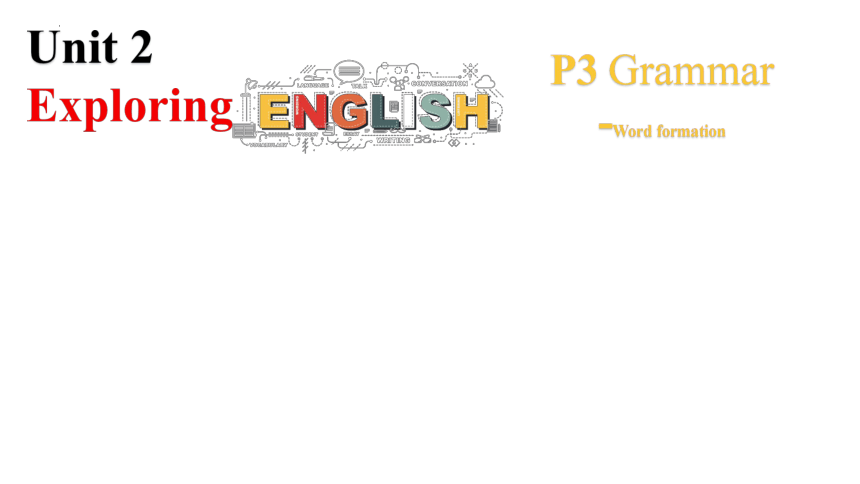
|
|
| 格式 | pptx | ||
| 文件大小 | 3.2MB | ||
| 资源类型 | 教案 | ||
| 版本资源 | 外研版(2019) | ||
| 科目 | 英语 | ||
| 更新时间 | 2022-09-13 18:56:33 | ||
图片预览

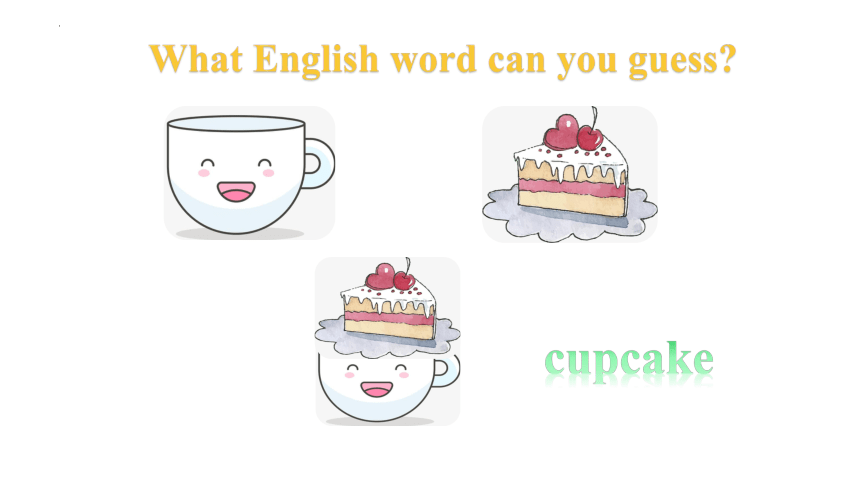
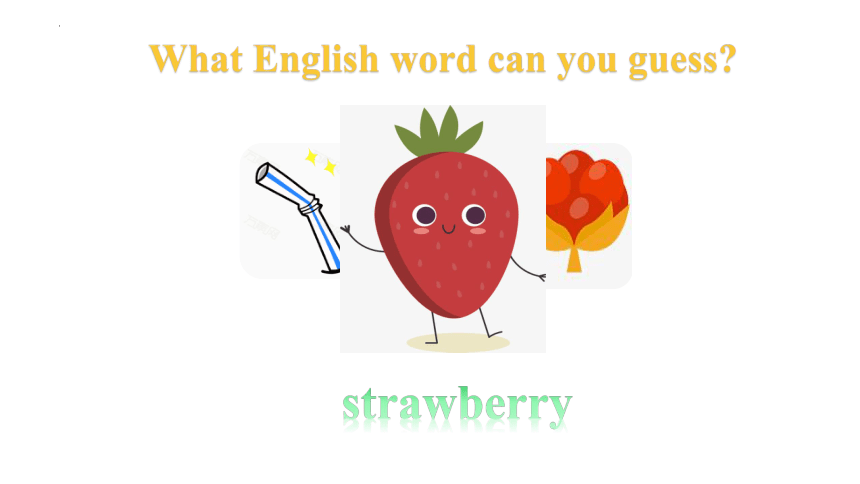
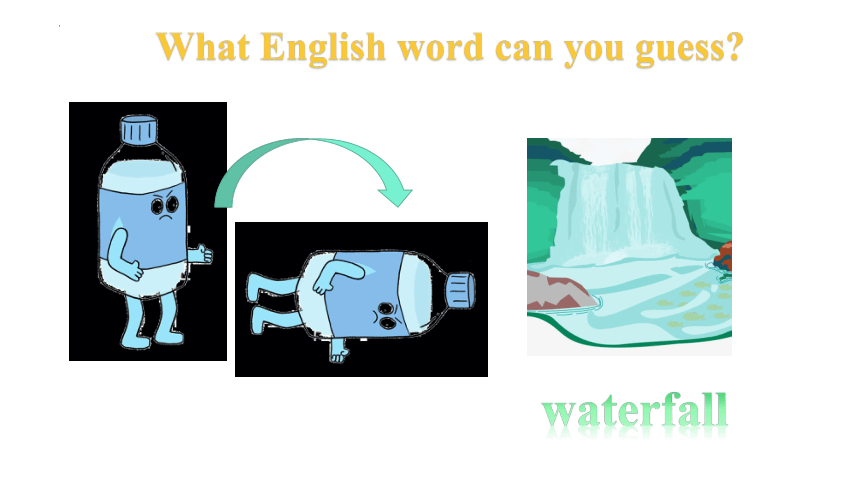
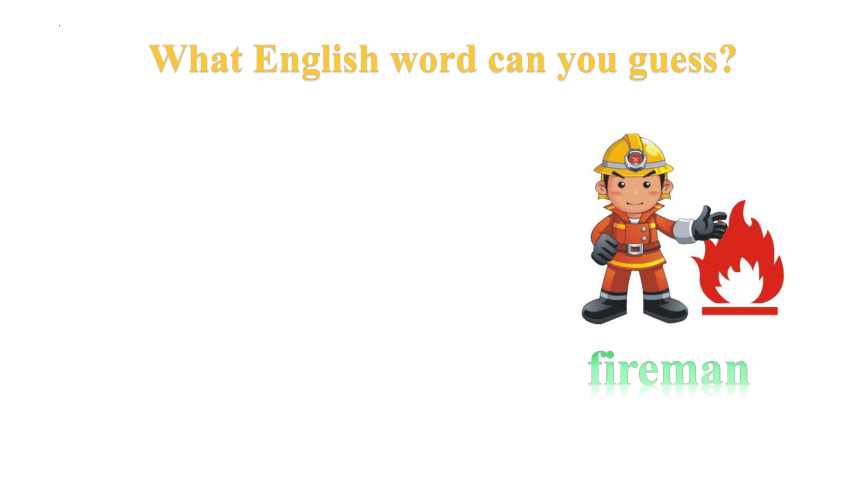
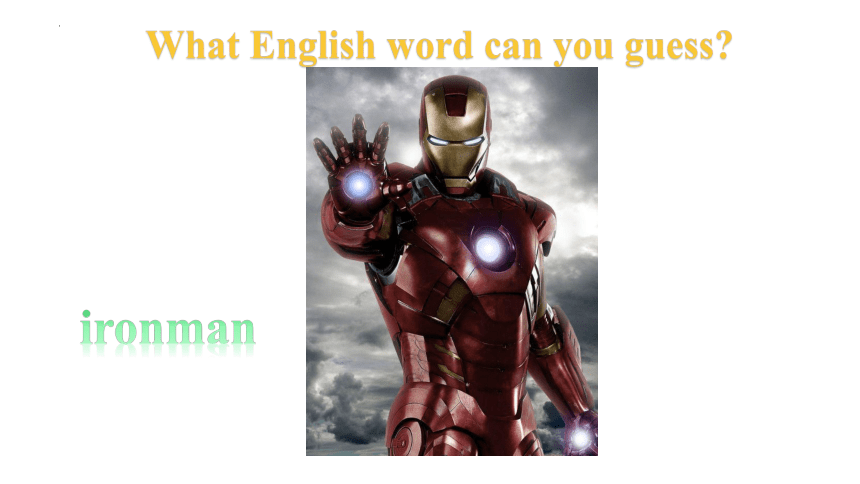
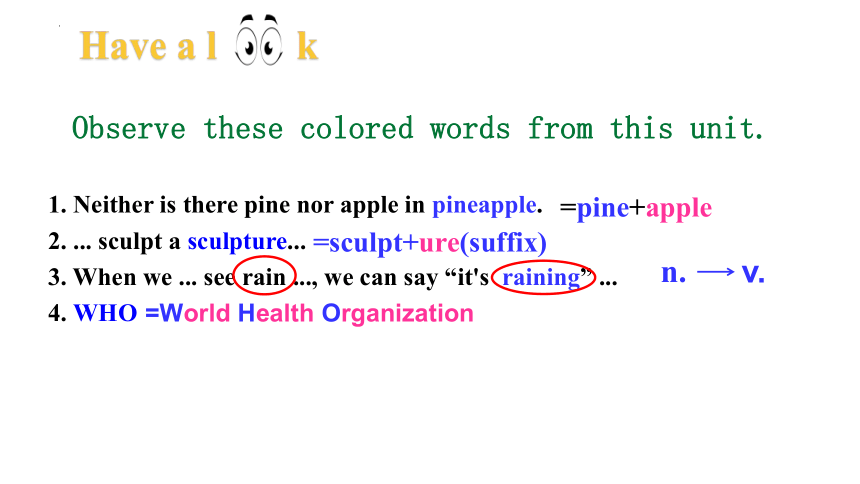

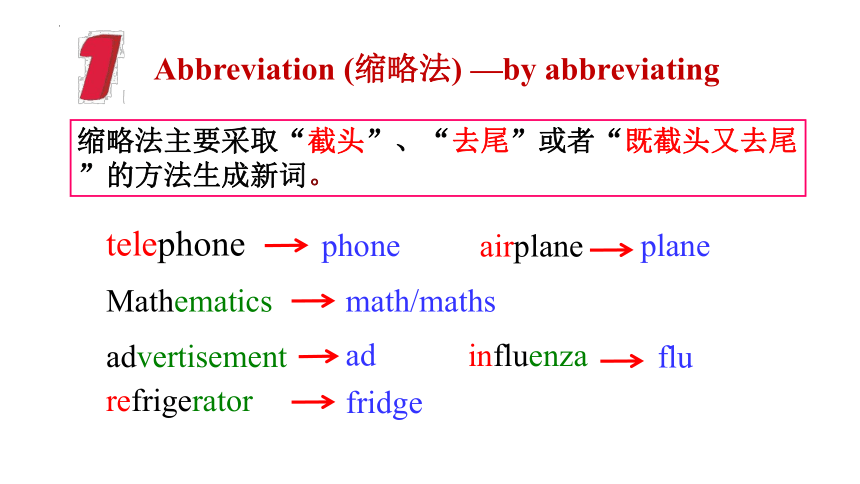
文档简介
(共24张PPT)
Unit 2
Exploring
P3 Grammar
-Word formation
What English word can you guess
cupcake
What English word can you guess
strawberry
What English word can you guess
waterfall
What English word can you guess
fireman
What English word can you guess
ironman
Observe these colored words from this unit.
1. Neither is there pine nor apple in pineapple.
2. ... sculpt a sculpture...
3. When we ... see rain ..., we can say “it's raining” ...
4. WHO
=pine+apple
=sculpt+ure(suffix)
n.
v.
=World Health Organization
Have a l k
Word formation
1. Abbreviation 缩略法
2. Conversion 转化法
3. Derivation 派生法
4. Compounding 合成法
Focus on
基本用法
缩略法主要采取“截头”、“去尾”或者“既截头又去尾”的方法生成新词。
Abbreviation (缩略法) —by abbreviating
phone
math/maths
ad
fridge
flu
plane
telephone
airplane
Mathematics
advertisement
refrigerator
influenza
CD ( compact disk)
CCTV( China Central Television)
NBA (National Basketball Association)
UFO( unidentified flying object)
UN( United Nations)
USA( United States of America)
另外还有许多缩写词是由各个单词的首字母组成 (initialism)
Conversion(转化法)
—by changing the part of speech
一个词从一种词类转化为另一种或几种词类的方法称为“转化法”。如名词, 形容词转化为动词。
The child was eyeing the chocolate cake.
She took a drink from the glass and then put it down.
You must slow down or you'll make yourself ill.
n.→v.,意为“注视”
v.→n.,意为“饮料”
adj.→v.,意为“放慢速度”
Derivation (派生法)
—by adding a prefix or suffix
派生词一般有前缀(prefix)+单词,或单词+后缀(suffix)构成。
前缀+单词一般不改变原词的词性,但要引起词义的变化,一部分可构成反义词。
① I dislike waiting for anything.
② I had completely misread his intentions.
mis-+read, 意为“误解”
dis-+like, 意为“不喜欢,厌恶”
前缀
单词+后缀一般不改变原词的基本含义,只改变其词性。
①There is a growing need for qualified teachers of Business English.
teach+-er, 表示人,意为“教师”
②They will introduce a new washer to the public.
wash+-er, 表示物,意为“洗衣机”
③Not all people can make this achievement.
achieve+-ment,抽象名词,意为“成就,成绩”
后缀
sunflower
sun
flower
Compounding (合成法)
— by combining two or more words
复合名词
1. 名词+名词
sunglass
sun
glass
moonlight
moon
light
bookshelf
book
shelf
fireman
fire
man
2. 形容词+名词
loudspeaker, midnight, blackboard,
software, mainland
3. v-ing+名词
waiting-room, sitting-room
4. 动词+名词
playground, watchtower,
chopsticks, washroom
handwriting, thanksgiving, roller-skating
5. 名词+v-ing
6. 动词+副词
get-together, break-through
7. 副词+动词
downfall, outbreak
复合形容词
1. 形容词+名词+v-ed
kind-hearted, short-sighted
2. 形容词+v-ing
good-looking, easy-going
3. 副词+v-ing
hard-working, ever-lasting
4. 名词+v-ing
English-speaking, peace-loving
5. 名词+v-ed
man-made, air-borne
6. 副词+v-ed
well-known, well-balanced
7. 形容词+名词
mid-east, round-trip
downstairs, everyday, take-away, outdoor, one-way, part-time, two-month, secondhand, so-so, on-line, so-called
8. 其他
复合副词
其他
复合动词
over + come = overcome
fifty + four = fifty-four
复合数词
everyone, somebody, anything, nobody
down + stairs = downstairs
whole + heartedly = wholeheartedly
复合代词
(副词+动词)
(不定代词+名词)
( 形容词+名词)
(副词+副词)
a Neither is there pine nor apple in pineapple.
b … sculpt a sculpture…
c When we… see rain…, we can say “it’s raining”…
d WHO
P17 1
1. abbreviating
2. changing the part of speech
3. adding a prefix or suffix
4. combining two or more words
Match the colored words to the types of word formation.
Can you find more examples of each type in the reading passage
1 abbreviating:
IT, US
2 changing the part of speech:
When we… see… snow, we can say… “it’s snowing”.
3 adding a prefix or suffix:
paint–painting, hard–hardly, soft–softly,
harm–harmless / harmful, shame–shameless / shameful, visible–invisible
4 combining two or more words:
hamburger, eggplant, seasick, airsick, carsick, homesick, homework, housework
P17 1
penfriend
well-known
incorrect
unhappy
improvement
calm
presenting
WTO
ASAP
Complete the passage with the help of word formation.
Unit 2
Exploring
P3 Grammar
-Word formation
What English word can you guess
cupcake
What English word can you guess
strawberry
What English word can you guess
waterfall
What English word can you guess
fireman
What English word can you guess
ironman
Observe these colored words from this unit.
1. Neither is there pine nor apple in pineapple.
2. ... sculpt a sculpture...
3. When we ... see rain ..., we can say “it's raining” ...
4. WHO
=pine+apple
=sculpt+ure(suffix)
n.
v.
=World Health Organization
Have a l k
Word formation
1. Abbreviation 缩略法
2. Conversion 转化法
3. Derivation 派生法
4. Compounding 合成法
Focus on
基本用法
缩略法主要采取“截头”、“去尾”或者“既截头又去尾”的方法生成新词。
Abbreviation (缩略法) —by abbreviating
phone
math/maths
ad
fridge
flu
plane
telephone
airplane
Mathematics
advertisement
refrigerator
influenza
CD ( compact disk)
CCTV( China Central Television)
NBA (National Basketball Association)
UFO( unidentified flying object)
UN( United Nations)
USA( United States of America)
另外还有许多缩写词是由各个单词的首字母组成 (initialism)
Conversion(转化法)
—by changing the part of speech
一个词从一种词类转化为另一种或几种词类的方法称为“转化法”。如名词, 形容词转化为动词。
The child was eyeing the chocolate cake.
She took a drink from the glass and then put it down.
You must slow down or you'll make yourself ill.
n.→v.,意为“注视”
v.→n.,意为“饮料”
adj.→v.,意为“放慢速度”
Derivation (派生法)
—by adding a prefix or suffix
派生词一般有前缀(prefix)+单词,或单词+后缀(suffix)构成。
前缀+单词一般不改变原词的词性,但要引起词义的变化,一部分可构成反义词。
① I dislike waiting for anything.
② I had completely misread his intentions.
mis-+read, 意为“误解”
dis-+like, 意为“不喜欢,厌恶”
前缀
单词+后缀一般不改变原词的基本含义,只改变其词性。
①There is a growing need for qualified teachers of Business English.
teach+-er, 表示人,意为“教师”
②They will introduce a new washer to the public.
wash+-er, 表示物,意为“洗衣机”
③Not all people can make this achievement.
achieve+-ment,抽象名词,意为“成就,成绩”
后缀
sunflower
sun
flower
Compounding (合成法)
— by combining two or more words
复合名词
1. 名词+名词
sunglass
sun
glass
moonlight
moon
light
bookshelf
book
shelf
fireman
fire
man
2. 形容词+名词
loudspeaker, midnight, blackboard,
software, mainland
3. v-ing+名词
waiting-room, sitting-room
4. 动词+名词
playground, watchtower,
chopsticks, washroom
handwriting, thanksgiving, roller-skating
5. 名词+v-ing
6. 动词+副词
get-together, break-through
7. 副词+动词
downfall, outbreak
复合形容词
1. 形容词+名词+v-ed
kind-hearted, short-sighted
2. 形容词+v-ing
good-looking, easy-going
3. 副词+v-ing
hard-working, ever-lasting
4. 名词+v-ing
English-speaking, peace-loving
5. 名词+v-ed
man-made, air-borne
6. 副词+v-ed
well-known, well-balanced
7. 形容词+名词
mid-east, round-trip
downstairs, everyday, take-away, outdoor, one-way, part-time, two-month, secondhand, so-so, on-line, so-called
8. 其他
复合副词
其他
复合动词
over + come = overcome
fifty + four = fifty-four
复合数词
everyone, somebody, anything, nobody
down + stairs = downstairs
whole + heartedly = wholeheartedly
复合代词
(副词+动词)
(不定代词+名词)
( 形容词+名词)
(副词+副词)
a Neither is there pine nor apple in pineapple.
b … sculpt a sculpture…
c When we… see rain…, we can say “it’s raining”…
d WHO
P17 1
1. abbreviating
2. changing the part of speech
3. adding a prefix or suffix
4. combining two or more words
Match the colored words to the types of word formation.
Can you find more examples of each type in the reading passage
1 abbreviating:
IT, US
2 changing the part of speech:
When we… see… snow, we can say… “it’s snowing”.
3 adding a prefix or suffix:
paint–painting, hard–hardly, soft–softly,
harm–harmless / harmful, shame–shameless / shameful, visible–invisible
4 combining two or more words:
hamburger, eggplant, seasick, airsick, carsick, homesick, homework, housework
P17 1
penfriend
well-known
incorrect
unhappy
improvement
calm
presenting
WTO
ASAP
Complete the passage with the help of word formation.
